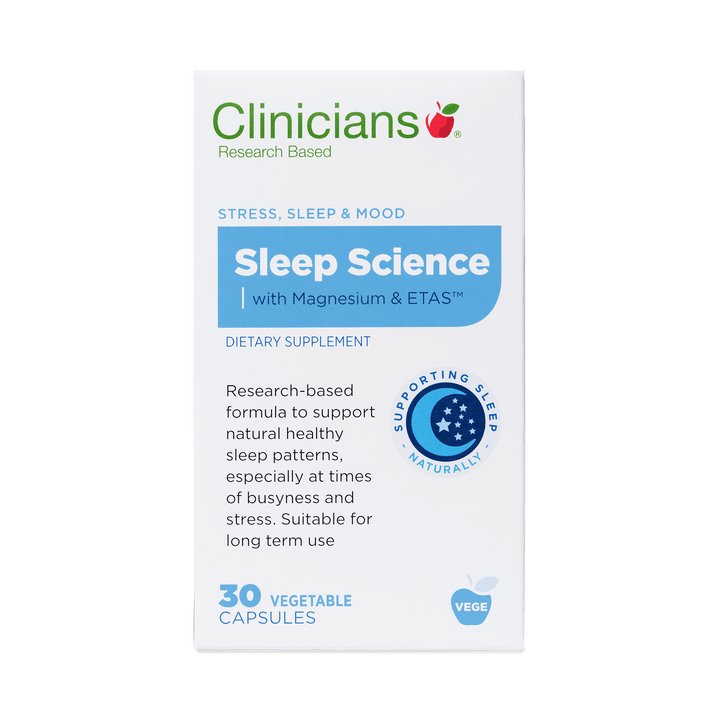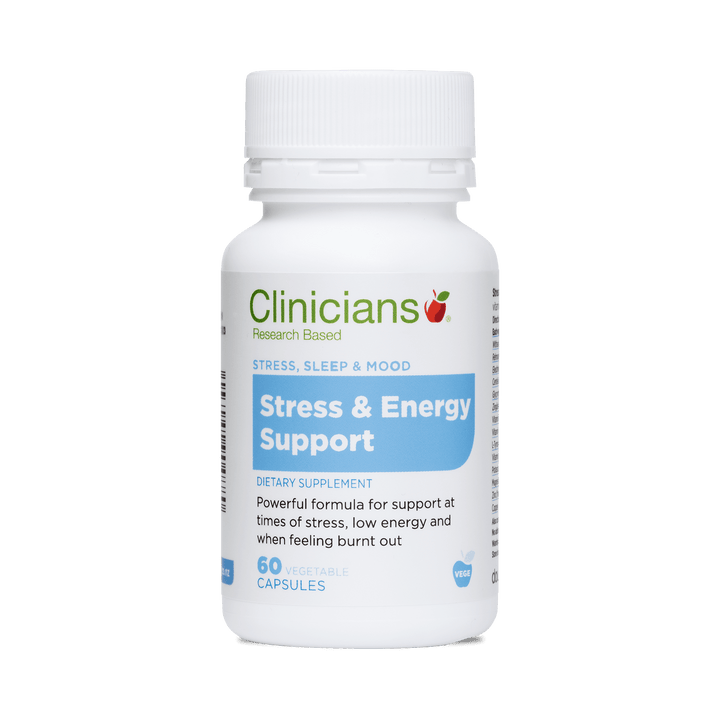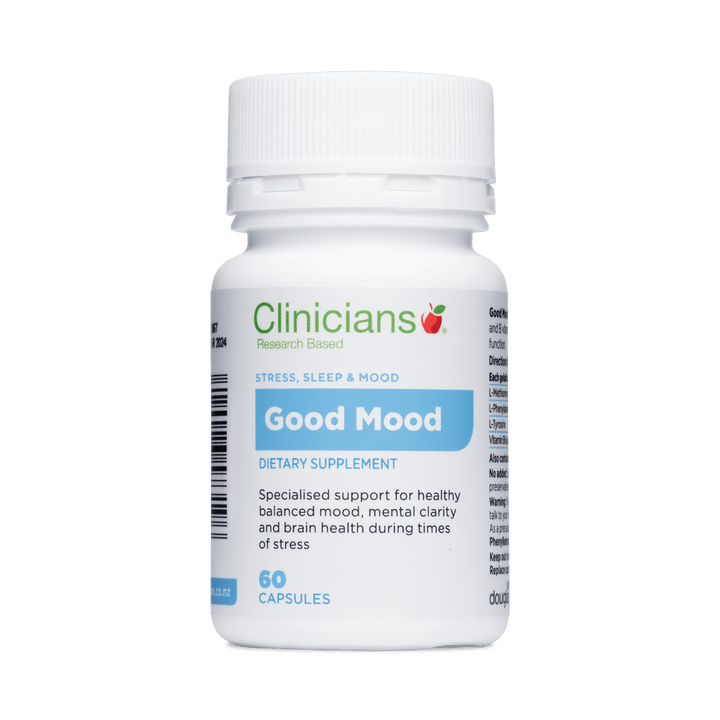Life is made up of a series of ups and downs. That means stress is just a natural part of life, like joy and happiness. But stress isn't a nice feeling, so how can we manage it?
Stress comes in many shapes and sizes and often affects us without us even recognising it. There are the more obvious life stressors such as a death of a loved one, moving house or loss of employment.
But there can be less noticeable stressors that add up over time.
These might be things, like:
- working long hours
- an unhappy relationship
- trouble with the kids
- daily pain or discomfort, and
- yes, living through a pandemic!
It's important to keep our stress levels in check because long-term stress can have a major influence on our physical health as well as our mood, behaviour and sense of well-being.
For example, research shows that long-term stress can increase your risk of:
- head tension
- digestive illness
- poor sleep quality
- cardiovascular issues
And, that's just to name a few.
You'll also see from that list that long-term stress can effect the body in many different ways. You may even experience more than one symptom at once. So it's important to have some tools up your sleeve to help cope with stress and to ask for help if life is feeling overwhelming.
Ways to reduce and manage stress
Here are five tips you can add to your daily or weekly routine. They're effective, cheap and easy to practice at home. Give them a go!
1. Go outside and connect with something green
Action: Spend 20 to 30 minutes sitting or walking in nature.
Studies show that at least 20 minutes a day in nature can help our:
- blood pressure
- pulse rate
- cortisol levels (cortisol is our stress hormone).1
Grab a pair of comfortable shoes and explore what's within walking distance from where you work or live. Your local city council website might also have some suggestions for popular walks nearby.
To get the most out of your walk, try to be present in the moment. Avoid conversations, reading and the use of any electronic devices.
If your mind starts wandering, try using your senses to bring you back:
- Smell: What can you smell? Freshly cut grass, compost, flowers, someone's cooking?
- Hear: What can you hear? A bird? Can you tell which one?
- See: What can you see around you? Take a closer look at something you'd usually walk past or wouldn't notice, like different types of leaves on plants.
- Touch: What surface are you walking on? Is it hard, soft, springy? Feel the grass, is it dry or damp? Can you feel the wind on your face?
2. Listen to music
Action: Listen to music that makes you feel relaxed, for at least 30 minutes.
Music has been used for hundreds of years to treat illnesses and restore harmony between mind and body.
It's been shown to:
- stimulate the production of dopamine, the "feel-good" chemical in our brain
- support immune system function
- act as a diversion or distraction from negative thoughts2.
You can incorporate music into your daily life in a number of ways.
For example, by:
- listening to music as you work, or
- listening to music as a type of meditation.
For the second option, you'll be listening to music and not doing anything else.
Find a quiet room and a comfortable upright seated position. Close your eyes and, if you like, grab a blanket and cushions to help you feel comfortable. If your home is a little too noisy, try noise-cancelling headphones.
There is no strict rule on what music you should listen to. We're all different and our tastes in music are different. Just choose an artist, album or track list that you find relaxing.
3. Make time to meditate
Action: Meditate for 20 minutes.
Meditation has been around for thousands of years.
It's an activity that usually combines all of the following:
- sitting in an upright position,
- being present in the moment, and
- focusing on your breath.
Similar to a walk in nature, meditation has been shown to calm our breathing, pulse rate and support our blood pressure – creating a state of relaxation.
If you're completely new to meditation and are looking for a bit more structure, you can also try guided meditation. Find a local teacher or explore resources online. Most online resources are either free or have a small fee attached.
You can find mini or full-length meditations on apps like Calm, Headspace or Aura.
4. Get the right nutrition in your body
Action: Put together a 'foods for stress' shopping list
When you're really stressed, what you eat might not be at the top of your list. It can be easy to skip or forget to eat meals, grab takeaways or reach for the first thing in the cupboard or fridge.
But making sure you eat regularly while maintaining a balanced diet during times of stress is important. Knowing that your body has the right fuel in it means you'll have one less thing to worry about.
And, you can even use some food to your advantage to help reduce symptoms of stress:
- Eggs: Rich in a nutrient called choline, eggs are good for brain health and studies show they may protect against stress.2
- Berries: Antioxidants in berries can help reduce inflammation in your body, and therefore cortisol levels.
- Brazil nuts, whole grains, beans, chickpeas and seeds (pumpkin and hemp): These foods are high in magnesium, a mineral used to help relax the body. It's often used in sleep supplements to help prepare the body for a night of rest.
- Herbs: There are so many herbs that help relax the mind and body and the best way to get their benefits is through herbal tea blends. Try Chamomile, Lemon Balm, Hops and Lavender.
Don't forget to keep hydrated, too!
5. Try saying 'No'
Action: Remove something from your schedule.
Do you find yourself running from one thing to the next with no time to relax? You might need to look at your schedule. If you're overcommitting yourself and saying 'yes' to too many things, this may be at the expense of your health.
Try reducing the things that are causing you stress:
- What can you say 'No' to?
- What can you delegate to someone else?
- What can you push into the future, when things are less busy?
If you'd describe yourself as a "people-pleaser" the thought of saying 'no' can be scary. Yet don't assume you're letting someone down or disappointing them. Explain why you can't complete a task or attend an event – you might be surprised by how understanding people are. People that care about you will want you to prioritise yourself.
Feeling overwhelmed with stress?
Sometimes there are limits on what we can do, to make ourselves feel better. Don't be afraid to ask for help. Studies show that over half of all New Zealanders will experience mental distress at some point in their lifetime. There is no shame in asking for help and you're not alone.
If you're feeling overwhelmed please let your friends and whānau know, and make an appointment with your health practitioner.
Stress & Energy Support
A combination of herbs, vitamins, minerals and amino acids for support in times of stress, burn out and low energy.
References:
1https://www.frontiersin.org/articles/10.3389/fpsyg.2019.00722/full
https://www.pnas.org/doi/10.1073/pnas.2018472118
2https://www.health.harvard.edu/mind-and-mood/how-music-can-help-you-heal
https://www.nature.com/articles/nn.2726
3https://www.ncbi.nlm.nih.gov/pmc/articles/PMC3327365/
Featured image from: Pexels.com / Andrea Piacquadio
















